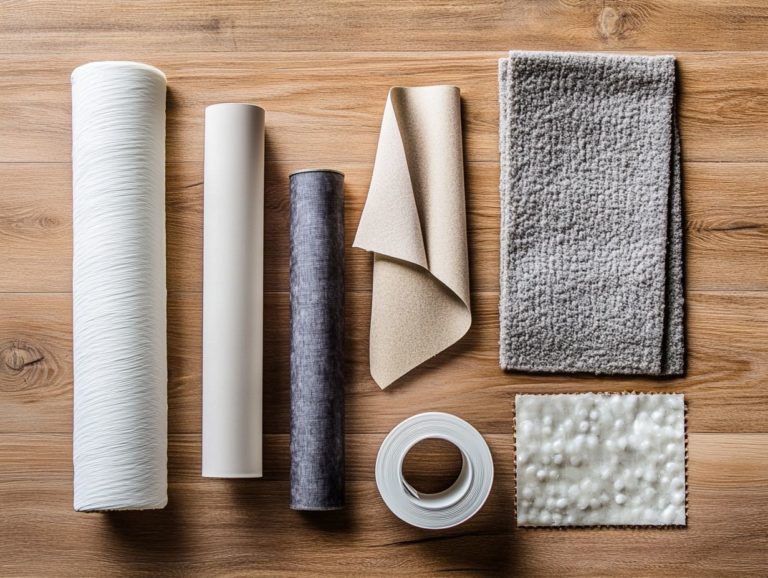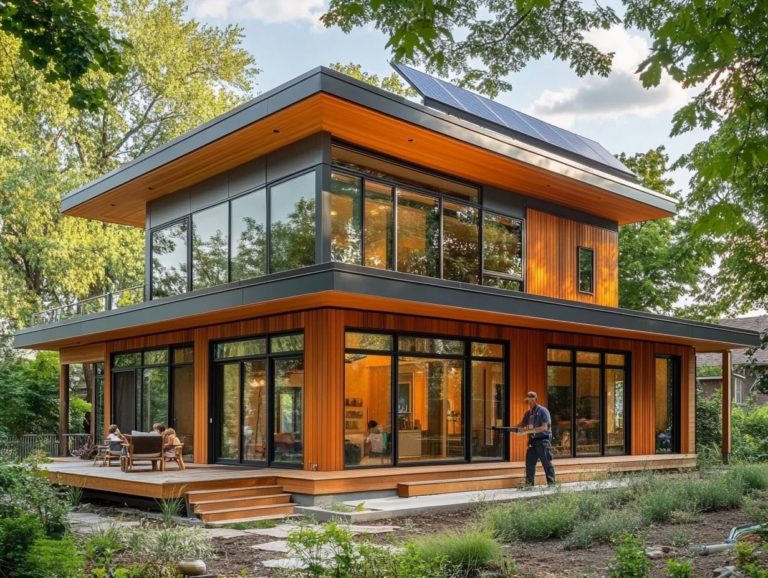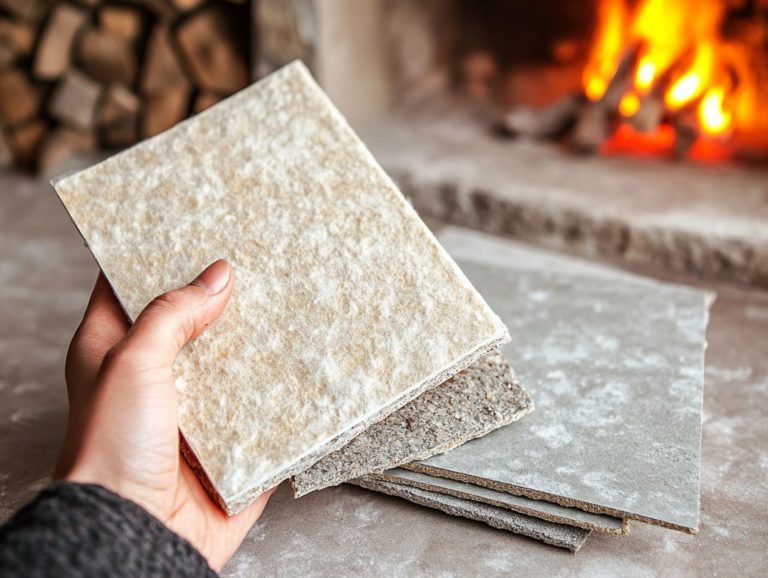5 Benefits of Proper Home Insulation
Proper home insulation is essential for you and provides many benefits that extend far beyond merely keeping your space warm in winter and cool in summer.
By investing in insulation, you can reduce energy bills, improve indoor air quality, enhance comfort, and protect your home from moisture. The benefits are hard to ignore!
This article delves into five key benefits of proper insulation, addresses common questions about its types and costs, and provides tips on selecting the right insulation for your needs.
Discover how this investment can transform your home into a more efficient and comfortable sanctuary!
Contents
Key Takeaways:
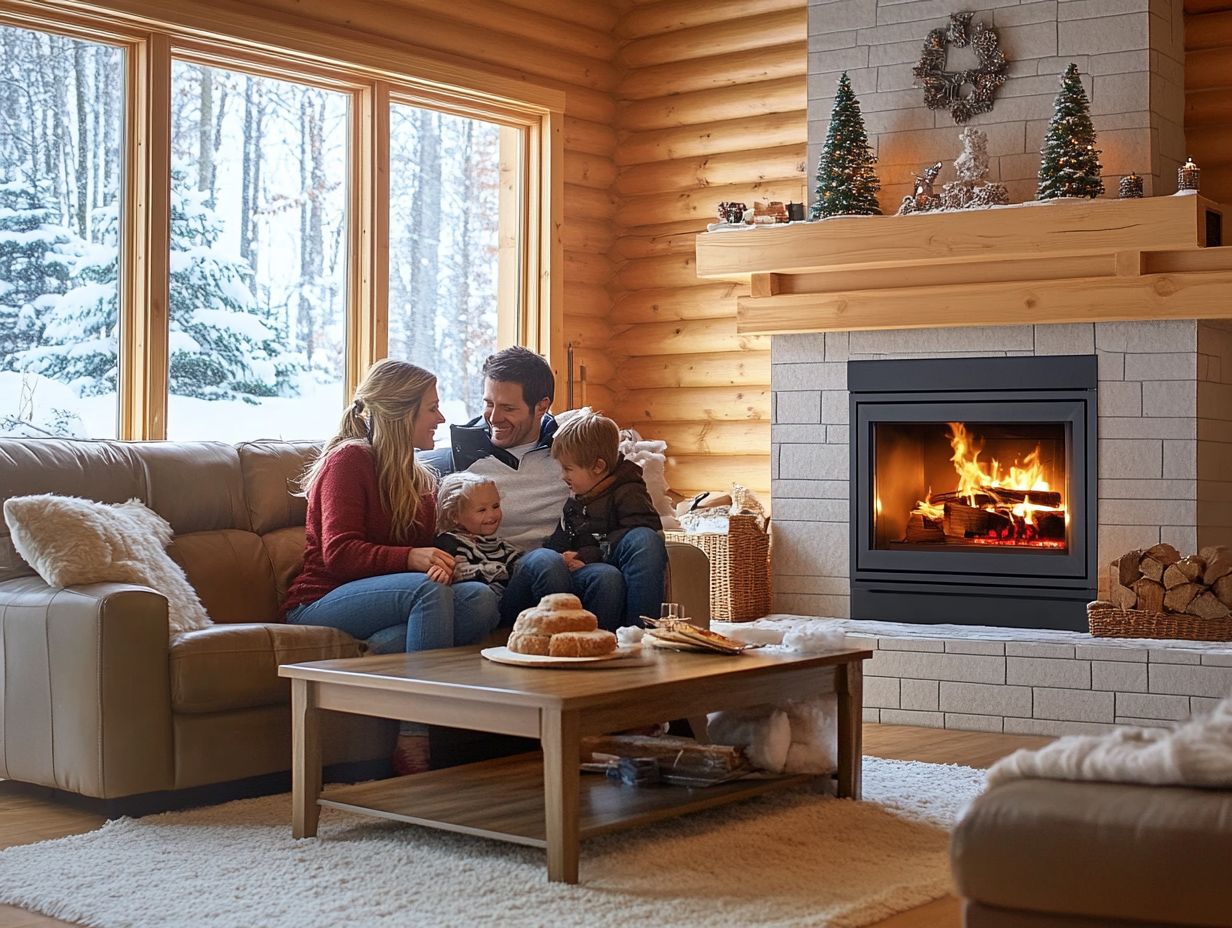
Proper home insulation can save energy and reduce utility bills, making it a cost-effective investment.
Insulation can improve indoor air quality by preventing air leaks and reducing the entry of pollutants.
Adding insulation to a home can increase comfort by regulating temperature and reducing noise from outside.
1. Saves Energy and Reduces Utility Bills
Home insulation is an essential investment that can significantly improve your energy efficiency, leading to impressive reductions in heating and cooling costs. This ultimately translates to lower energy bills.
By minimizing heat loss during winter and keeping your home cooler in the summer, effective insulation systems help reduce energy consumption dramatically, making it a vital project for those who are energy-conscious.
The benefits of insulation extend beyond immediate savings; they contribute to long-term financial gains and promote environmental sustainability as well.
Different insulation materials work uniquely to achieve these goals. For example:
- Cellulose insulation, crafted from recycled paper, effectively traps air and reduces heat flow, making it both eco-friendly and efficient.
- Fiberglass insulation creates air pockets that prevent heat transfer and is widely used in numerous homes.
You ll discover helpful insights from energy audits, which are inspections that help you find ways to save energy. These assessments reveal where to improve and suggest solutions.
Research indicates that homeowners might save up to 20% on their energy bills by installing quality insulation. Various government incentives are available to provide financial assistance for insulation projects, making it easier than ever for you to undertake energy-saving upgrades.
2. Improves Indoor Air Quality
Proper home insulation significantly enhances energy efficiency and plays a crucial role in elevating indoor air quality. By effectively controlling moisture levels, it helps mitigate mold issues that can pose health risks to you and your loved ones. However, it’s important to be aware of the 5 myths about home insulation that can lead to misconceptions.
Insulation acts like a shield against moisture and airborne pollutants. This barrier keeps moisture out, reducing the risk of mold.
When your insulation is well-maintained, it continuously fosters a healthier living environment by ensuring that pollutants stay outside where they belong. Regular inspections and upkeep are vital to enjoying these long-term benefits; neglecting them can lead to degradation and potential health hazards, ultimately undermining the very purpose of having insulation in the first place.
3. Increases Comfort and Reduces Noise
Want to save money? Insulation can help! In addition to saving energy, the importance of home insulation greatly enhances your comfort levels by effectively minimizing noise pollution through sound absorption, creating a serene living environment that elevates your overall enjoyment of your home.
Among the various insulation types available, cellulose insulation truly shines with its remarkable sound-dampening properties. This eco-friendly choice, crafted from recycled paper products, not only reduces your energy costs but also absorbs sound, making your spaces feel more tranquil. Many homeowners have reported significant improvements in the peace of their bedrooms after installing cellulose insulation in their walls and ceilings.
Similarly, spray foam insulation offers outstanding acoustic benefits by expanding to fill gaps and cracks those pesky barriers that allow sound to seep through. For instance, consider a family that transformed their bustling living room into a quiet retreat by applying spray foam. Now, they can host gatherings without the din of the outside world intruding.
These insulation methods not only improve energy efficiency but also enhance your overall living experience, making your home a more enjoyable haven. For more insights, check out the 5 best insulation materials for energy savings.
Are you ready to transform your home? Consider investing in proper insulation today!
4. Protects the Home from Moisture and Mold

Effective home insulation is crucial for protecting your property from moisture and mold. These issues can weaken structures and harm health.
Moisture can cause many problems, especially in areas with changing temperatures. Understanding how insulation affects moisture control is essential.
Vapor barriers are important; they stop water vapor from entering insulated walls. Thicker insulation also helps keep temperatures steady, reducing condensation risk.
Choosing the right insulation type and thickness is key for controlling moisture in your home.
5. Adds Value to the Home
Investing in quality home insulation does more than just boost your energy efficiency! It significantly enhances your property’s value, offering excellent returns on investment, especially when you keep in mind the 5 things to consider when insulating.
Research shows that homes with upgraded insulation can fetch up to 20% more than similar properties with outdated systems. Buyers are increasingly inclined toward energy-efficient homes, often willing to pay a premium for features that lower utility costs.
This trend highlights the rising importance of sustainability in real estate. Effective insulation is not merely a comfort upgrade, but a critical element in attracting buyers and maximizing your returns.
Don’t overlook how insulation can enhance your home’s value! Whether renovating or selling, effective insulation is a game changer.
What Is Home Insulation and How Does It Work?
Home insulation is the materials and methods used to keep heat inside during winter and outside during summer. This ensures your home stays comfortable and saves energy.
At its core, this process relies on heat transfer principles, occurring through conduction, convection, and radiation. Effective insulation materials like fiberglass, cellulose, and foam trap air within their structure, slowing heat movement into or out of your living space.
By acting as a barrier to heat flow, these materials significantly reduce the need for heating in winter and cooling in summer, ultimately leading to lower energy bills.
However, the efficiency of your insulation system depends on proper installation. Even the best materials can fall short if not installed correctly, allowing unwanted air exchange. It s essential to ensure that every inch is meticulously placed for maximum effectiveness.
What Are the Different Types of Home Insulation?
Here are some popular insulation types to consider:
You have several types of home insulation at your disposal, each offering unique benefits and applications, such as fiberglass, cellulose, spray foam, and rigid foam board. Understanding the distinct characteristics of these insulation types is essential for maximizing both energy efficiency and comfort in your home.
Fiberglass insulation is affordable and easy to install, making it great for attics. Cellulose, made from recycled materials, is excellent for sealing gaps.
- Spray foam insulation stands out with its superior air sealing, featuring an impressive R-value of about 6.5 to 7 per inch, perfect for hard-to-reach areas.
- Rigid foam board is versatile with R-values around 3.6 to 5 per inch, suitable for both foundation walls and roof applications.
Choosing the right insulation based on these characteristics and the specific areas of your home is crucial for achieving optimal energy efficiency.
How Much Does Proper Home Insulation Cost?

The cost of proper home insulation can fluctuate significantly, influenced by factors like the type of insulation materials you choose, the complexity of the installation, and the expertise of the contractors you hire.
You have a range of insulation materials available, from fiberglass and foam board to spray foam and cellulose. Each option comes with its own price tag and installation requirements.
For example, while fiberglass batts might seem like the most budget-friendly option at first glance, spray foam, despite its higher upfront cost, provides exceptional energy efficiency. This can lead to significant long-term savings by reducing your heating and cooling expenses.
The overall expense will also depend on the size of the area needing insulation and whether any existing materials need to be removed. By carefully weighing these factors, you can enjoy substantial returns on your investment through energy savings over time.
What Are the Signs That a Home Needs More Insulation?
Recognizing the signs that your home needs more insulation is crucial for maintaining energy efficiency. Look for indicators like fluctuating indoor temperatures, soaring energy bills, and noticeable drafts all of which suggest potential air leakage and insulation effectiveness issues.
You should also pay attention to cold walls that feel particularly chilly to the touch, which can indicate inadequate insulation. If you notice ice dams forming on your roof during winter, it might mean that your attic insulation is lacking, allowing heat to escape and melting snow unevenly.
Excessive moisture, like condensation on windows, can signal insulation problems. Conducting an energy audit can be a game-changer. It helps pinpoint these insulation deficiencies.
This targeted approach allows for improvements that enhance your comfort while lowering your energy costs.
How Can Proper Home Insulation Help with Energy Efficiency?
Proper home insulation is essential for achieving energy efficiency. It helps maintain consistent indoor temperatures, reduces reliance on heating and cooling systems, and ultimately results in significant energy savings. Exploring the benefits of sustainable insulation solutions can further enhance your home’s performance.
By implementing optimal insulation thickness tailored to your local climate and utilizing effective materials like fiberglass, spray foam, or cellulose, you can drastically enhance your home s energy performance. It’s also essential to consider the insulation’s R-value, which is a measure of how well insulation resists heat flow; higher values indicate better insulation efficiency.
Regular maintenance can dramatically extend your insulation s lifespan and boost your energy savings! Inspect for gaps, wear, or moisture damage to ensure your insulation remains effective over time. This commitment to upkeep contributes to a healthier home environment and further energy reductions.
What Are Some Tips for Choosing the Right Insulation for a Home?
Choosing the right insulation for your home requires careful consideration of several factors, including available options, quality, safety, and compliance with local building codes. This meticulous approach ensures that your insulation system performs optimally and lasts for years.
As a homeowner, evaluate insulation materials based on their R-value, which reveals how effectively the insulation will help maintain a comfortable temperature in your space.
Don’t overlook fire protection ratings; it’s vital to ensure that the materials you select offer adequate safety against flames and smoke.
Consider the environmental impact of your choices. Some materials are more eco-friendly than others, influencing both indoor air quality and the overall sustainability of your home.
Engaging qualified insulation contractors is a smart move. They not only bring expertise in proper installation techniques but also ensure compliance with safety and regulatory standards, maximizing the benefits of your insulation system.
Frequently Asked Questions
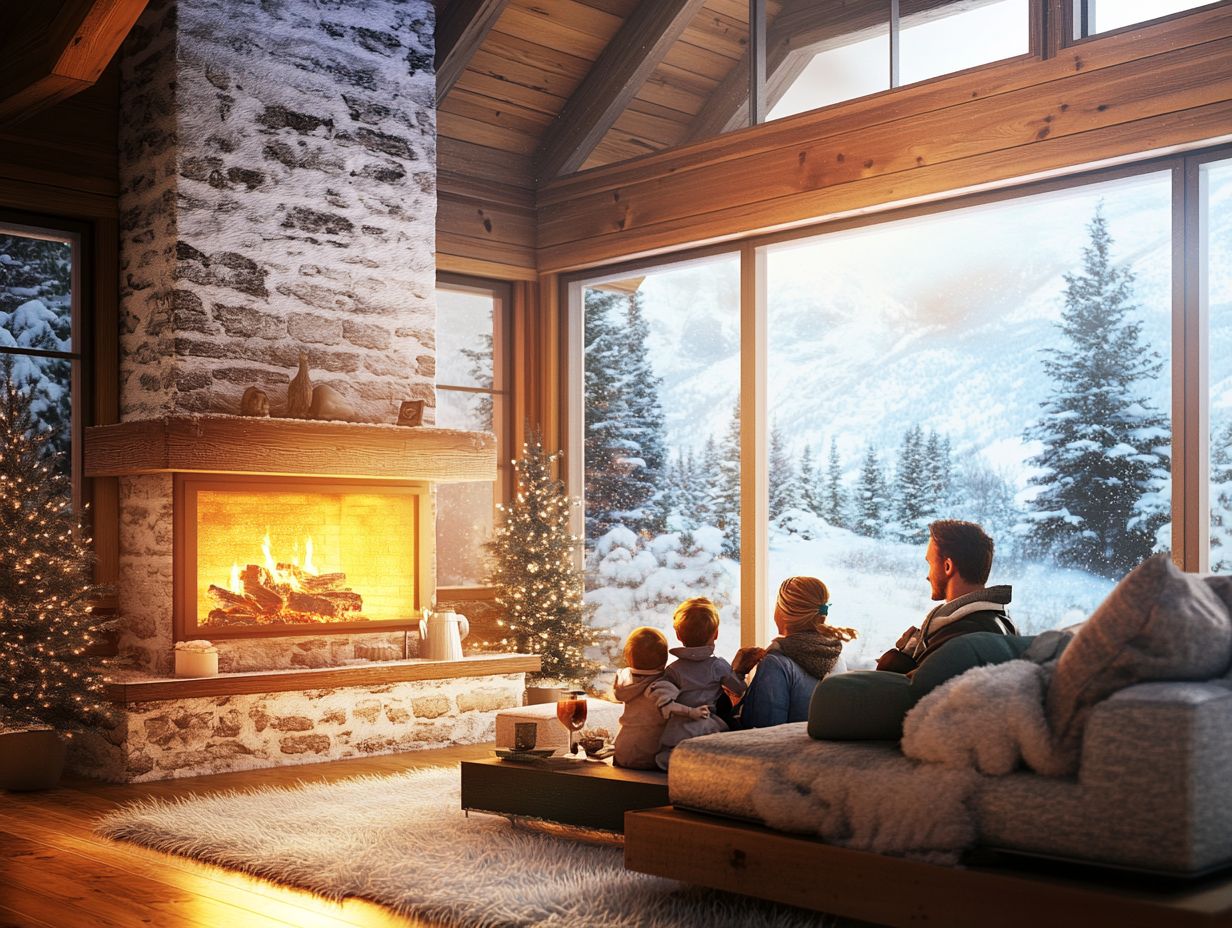
Curious about home insulation? Here are some frequently asked questions that can guide you!
1. What are the benefits of proper home insulation?
Proper home insulation offers many advantages. It boosts energy efficiency, improves indoor air quality, reduces noise, and can even enhance your home’s appearance, as detailed in 5 ways insulation can enhance home aesthetics, while also preventing water and mold issues.
2. How does home insulation improve energy efficiency?
Insulation keeps your home at a comfortable temperature. It stops hot or cold air from escaping, leading to lower energy bills.
3. Can home insulation improve indoor air quality?
Yes! Insulation blocks dust and allergens from entering your space. This is especially helpful for allergy or asthma sufferers.
4. How does insulation reduce noise levels?
Insulation absorbs sound, keeping outside noise at bay. This creates a calm, peaceful living environment, especially in busy areas.
5. How does insulation prevent water and mold issues?
Insulation seals cracks in your walls and foundation. This keeps moisture out, reducing the risk of mold, which can harm your health.
6. Can proper home insulation save me money?
Absolutely! By enhancing energy efficiency, insulation cuts heating and cooling costs. This leads to substantial savings on utility bills, making it a wise investment.

